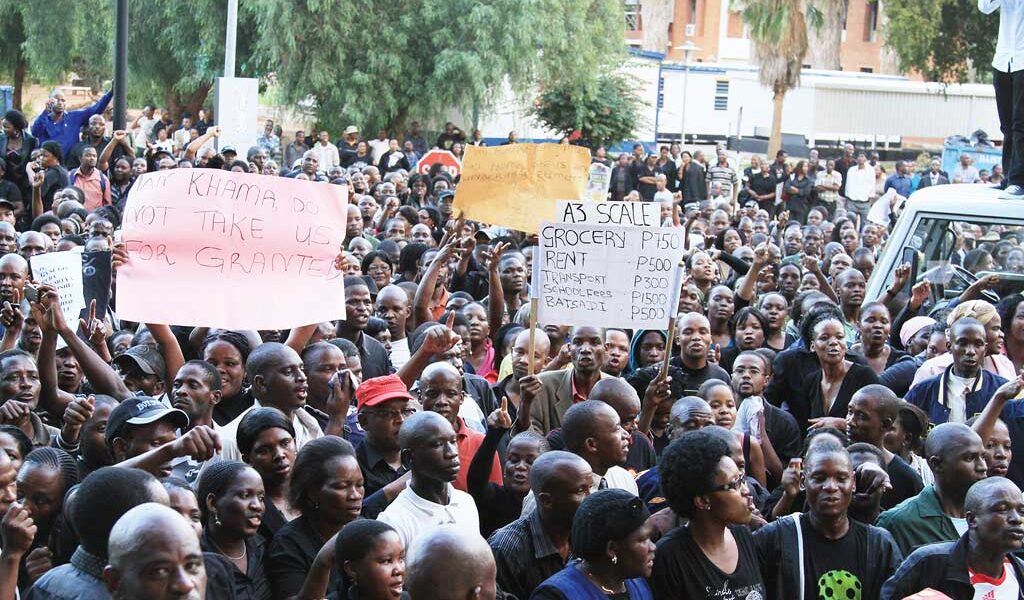- Public Service Act breached as hike was done outside PSBC
- Hike decision is reveiwable in a court of law
VINCENT MATUMO
A Public Finance expert at the University of Botswana, Professor Emmanuel Botlhale says that Government’s decision to give public servants a 3 percent pay raise outside of the Public Service Bargaining Council (PSBC) negotiations is unlawful even though it is well intended. Professor Botlhale says that the decision is reviewable in the Courts of law. The unilateral salary hike happens in the backdrop of a fresh ruling by the High Court in August 2015, where Judge Michael Leburu ruled that Bargaining Council is the sole decision maker recognised by the law in regards to public service working conditions and remunerations.
“As per provisions of the Public Service Act (2008), salary/wage negotiations should take place within the framework of the Bargaining Council, which comprises of the government and trade unions,” said Botlhale. He however, recognises that there is a deadlock with negotiations as the federation BOFEPUSU (Botswana Federation of Public Service Unions) and its breakaway former constituent, BOPEU (Botswana Public Employees Union) are currently embroiled in legal wrangles that have since paralysed the PSBC.
“It is common knowledge there have been issues on the part of trade unions as evidenced by the BOPEU-BOFEPUSU legal tussles that have caused a gridlock in salary/wage negotiations.” “However, even if the govt acted outside the Bargaining Council for ‘the greatest good for the greatest number’ à la Jeremy Bentham (1748-1832), doing so was against both the spirit and letter of the law (Public Service Act, 2008). Given that this action is ultra vires the law [Public Service Act], it is reviewable in the courts of the law.”
Meanwhile, the Director in the Directorate of Public Service Management, (DPSM) Ruth Maphorisa is reported to have said that they did not engage BOFEPUSU on the basis that they have a pending case before court, stating that it would have been violation of the ongoing case. Justice Leburu had ruled that President Ian Khama and have no power to decide on the conditions of public service including salaries. This was after President Khama gave a salary increase on the eve of General elections in 2014 and BOFEPUSU approached the court seeking definition of PSBC. Leburu also ruled that any such action is tantamount to interference and it is unlawful for Khama to vary conditions of service for employees outside the laid down procedure of the PSBC.
On the issue of whether rate of the pay rise was justifiable, Botlhale said that:
“Given the fact that public sector salaries and wages have not been significantly increased and/or adjusted since the onset of the global economic crisis in late 2008, the adjustment was justified. Furthermore, it is common knowledge that public sector employees have been looking forward to significant salary/wage increase for the past few years.”
However, Botlhale concedes that a 3 percent adjustment is reasonable looking at the economy which has never seen pre economic crisis levels.
“It is important to note that salary negotiations happen between 2 parties with different objectives who interact in the labour market. While the employee would typically negotiate, or expect, a higher wage/salary increase or adjustment, the employer would typically negotiate him/her down. Given the prevailing fiscal circumstances and in the pursuance of prudent fiscal husbandry, it’s difficult for one to imagine how the increase could be higher than 3 percent,” said the professor.
The salary adjustment is effective from April 1st and covers all public servants including those of the security organs, Botswana Police, Directorate of Intelligence and Security Services, Botswana Defence Force. and Directorate on Corruption and Economic Crime.

